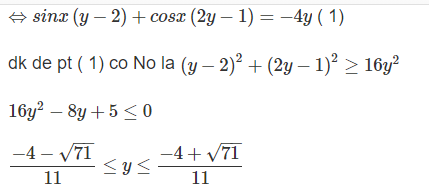
Hãy nhập câu hỏi của bạn vào đây, nếu là tài khoản VIP, bạn sẽ được ưu tiên trả lời.


\(ĐK:sinx-cosx\ne-2\)
\(< =>2y-1=sinx\left(1-y\right)+cosx\left(y+3\right)\)
Theo Bunhiacopxki:
\(\left[sinx\left(1-y\right)+cosx\left(y+3\right)\right]^2\)\(\le\left(sin^2x+cos^2x\right)\left[\left(1-y\right)^2+\left(y+3\right)^2\right]\)
\(< =>\left(2y-1\right)^2\le2y^2+4y+10\)
\(< =>2y^2-8y-9\le0\)
=> Bấm máy tìm Max, Min của y
(Sry máy tính của t bị ngáo không bấm ra)
\(\Rightarrow y.sinx-y.cosx+2y=sinx+3cosx+1\)
\(\Rightarrow\left(y-1\right)sinx-\left(y+3\right)cosx=1-2y\)
Theo điều kiện có nghiệm của pt lượng giác bậc nhất
\(\Rightarrow\left(y-1\right)^2+\left(y+3\right)^2\ge\left(1-2y\right)^2\)
\(\Leftrightarrow2y^2-8y-9\le0\)
\(\Rightarrow\dfrac{4-\sqrt{34}}{2}\le y\le\dfrac{4+\sqrt{34}}{2}\)
\(y_{max}=\dfrac{4+\sqrt{34}}{2}\) ; \(y_{min}=\dfrac{4-\sqrt{34}}{2}\)

a, \(y=sin^2x-2sinx+3cos^2x\)
\(=sin^2x-2sinx+3\left(1-sin^2x\right)\)
\(=3-2sinx-2sin^2x\)
Đặt \(sinx=t\left(t\in\left[0;1\right]\right)\)
\(\Rightarrow y=f\left(t\right)=3-2t-2t^2\)
\(\Rightarrow y_{min}=min\left\{f\left(0\right);f\left(1\right)\right\}=-1\)
\(y_{max}=max\left\{f\left(0\right);f\left(1\right)\right\}=3\)
b, \(y=sinx-cosx+sin2x+5\)
\(=sinx-cosx-\left(sinx-cosx\right)^2+6\)
Đặt \(sinx-cosx=t\left(t\in\left[-\sqrt{2};\sqrt{2}\right]\right)\)
\(\Rightarrow y=f\left(t\right)=-t^2+t+6\)
\(\Rightarrow y_{min}=min\left\{f\left(-\sqrt{2}\right);f\left(0\right)\right\}=4-\sqrt{2}\)
\(y_{max}=max\left\{f\left(-\sqrt{2}\right);f\left(0\right)\right\}=6\)

a: -1<=sin x<=1
=>-1+3<=sin x+3<=1+3
=>2<=sinx+3<=4
=>\(\dfrac{1}{2}>=\dfrac{1}{sinx+3}>=\dfrac{1}{4}\)
=>\(2>=\dfrac{4}{sinx+3}>=1\)
=>\(-2< =-\dfrac{4}{sinx+3}< =-1\)
=>-2+3<=y<=-1+3
=>1<=y<=2
y=1 khi \(\dfrac{-4}{sinx+3}+3=1\)
=>\(\dfrac{-4}{sinx+3}=-2\)
=>sinx+3=2
=>sin x=-1
=>x=-pi/2+k2pi
y=3 khi sin x=1
=>x=pi/2+k2pi
b: -1<=cosx<=1
=>4>=-4cosx>=-4
=>9>=-4cosx+5>=1
=>2/9<=2/5-4cosx<=2
=>2/9<=y<=2
\(y_{min}=\dfrac{2}{9}\) khi \(\dfrac{2}{5-4cosx}=\dfrac{2}{9}\)
=>\(5-4\cdot cosx=9\)
=>4*cosx=4
=>cosx=1
=>x=k2pi
y max khi cosx=-1
=>x=pi+k2pi
c: \(0< =cos^2x< =1\)
=>\(0< =2\cdot cos^2x< =2\)
=>\(-1< =y< =2\)
y min=-1 khi cos^2x=0
=>x=pi/2+kpi
y max=2 khi cos^2x=1
=>sin^2x=0
=>x=kpi

1: cot x=-6 nên cosx/sinx=-6
=>cosx=-6*sinx
\(F=\dfrac{sinx-3\cdot cosx}{cosx+2\cdot sinx}=\dfrac{sinx+18\cdot sinx}{-6\cdot sinx+2\cdot sinx}=\dfrac{20}{-4}=-5\)
2: cotx=1
=>cosx/sinx=1
=>cosx=sinx
\(I=\dfrac{sin^3x-4\cdot sin^3x}{sinx+3sinx}=\dfrac{5\cdot sin^3x}{4\cdot sinx}=\dfrac{5}{4}\cdot sin^2x\)
\(1+cot^2x=\dfrac{1}{sin^2x}\)
=>\(\dfrac{1}{sin^2x}=1+1=2\)
=>sin^2=1/2
=>\(I=\dfrac{5}{4}\cdot\dfrac{1}{2}=\dfrac{5}{8}\)
3: cotx=3
=>cosx/sinx=3
=>cosx=3*sinx
1+cot^2x=1/sin^2x
=>\(\dfrac{1}{sin^2x}=1+9=10\)
=>\(sin^2x=\dfrac{1}{10}\)
\(I=\dfrac{2\cdot sin^3x+cos^3x}{4\cdot sinx-6\cdot cosx}\)
\(=\dfrac{2\cdot sin^3x+\left(3\cdot sinx\right)^3}{4\cdot sinx-6\cdot\left(3\cdot sinx\right)}=\dfrac{2\cdot sin^3x+27\cdot sin^3x}{4\cdot sinx-18\cdot sinx}\)
\(=\dfrac{29}{-14}\cdot sin^2x=\dfrac{-29}{14}\cdot\dfrac{1}{10}=-\dfrac{29}{140}\)

Xét − sin x + 2 cos x + 4 = 0
Ta thấy − 1 2 + 2 2 < 4 2 nên phương trình vô nghiệm.
Do đó − sin x + 2 cos x + 4 ≠ 0 .
Như vậy, y = 2 sin x + cos x + 3 − sin x + 2 cos x + 4
⇔ y − sin x + 2 cos x + 4 = 2 sin x + cos x + 3
⇔ sin x 2 + y + cos x 1 − 2 y + 3 − 4 y = 0
Để phương trình có nghiệm thì 2 + y 2 + 1 − 2 y 2 ≥ 3 − 4 y 2
⇔ 5 y 2 + 5 ≥ 16 y 2 − 24 y + 9
⇔ 11 y 2 − 24 y + 4 ≤ 0
⇔ 2 11 ≤ y ≤ 2
Chọn đáp án D.

1. Không dịch được đề
2.
\(-1\le cos2x\le1\Rightarrow1\le y\le3\)
3.
a. \(-2\le2sinx\le2\Rightarrow-1\le y\le3\)
\(y_{min}=-1\) khi \(sinx=-1\Rightarrow x=-\dfrac{\pi}{2}+k2\pi\)
\(y_{max}=3\) khi \(sinx=1\Rightarrow x=\dfrac{\pi}{2}+k2\pi\)
b.
\(0\le cos^2x\le1\Rightarrow-1\le y\le2\)
\(y_{min}=-1\) khi \(cos^2x=1\Rightarrow x=k\pi\)
\(y_{max}=2\) khi \(cosx=0\Rightarrow x=\dfrac{\pi}{2}+k\pi\)
4.
\(y=\left(tanx-1\right)^2+2\ge2\)
\(y_{min}=2\) khi \(tanx=1\Rightarrow x=\dfrac{\pi}{4}+k\pi\)

pt suy ra:
sinx y-cosx y+2y=2sinx+3cosx+1
sinx(y-2)-cosx(y+3)=1-2y
pt có nghiệm khi và chỉ khi: (y-2)2+(y+3)2\(\ge\)(1-2y)2
\(\Leftrightarrow\) -2y2+6y+12\(\ge\)0
\(\Leftrightarrow\) \(\dfrac{3-\sqrt{33}}{2}\le y\le\dfrac{3+\sqrt{33}}{2}\)
Vậy ymax=\(\dfrac{3+\sqrt{33}}{2}\)